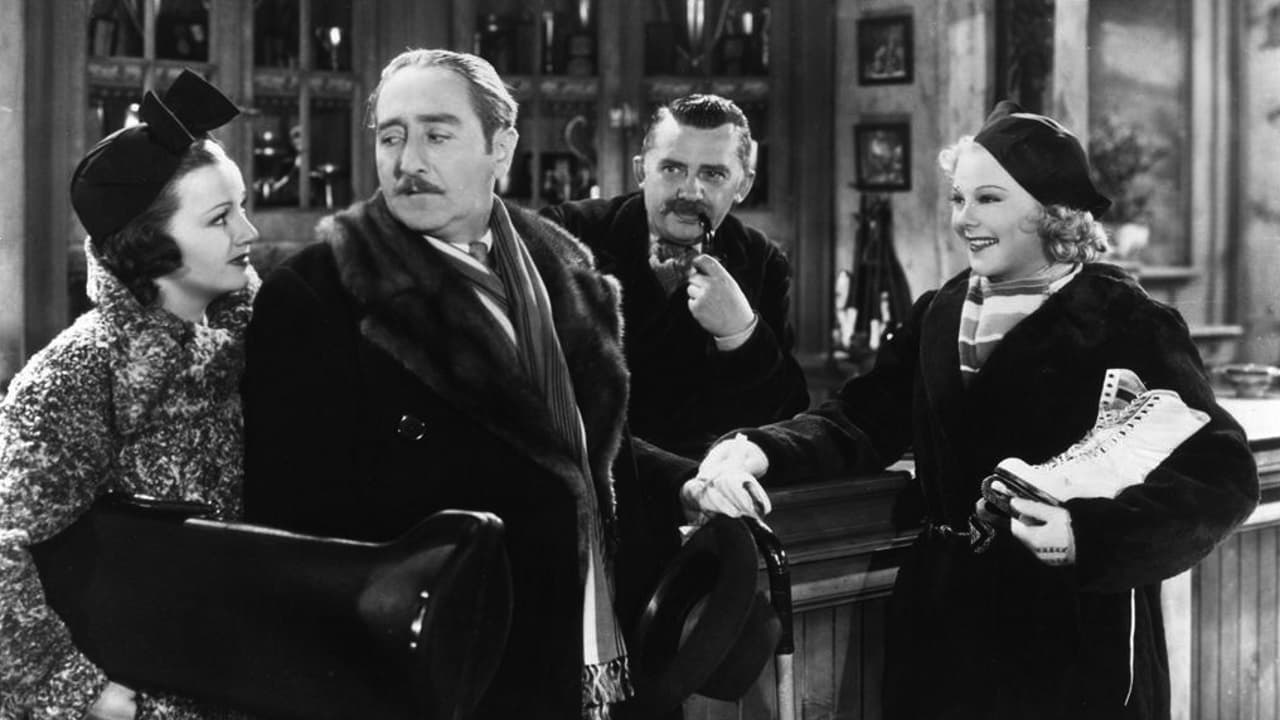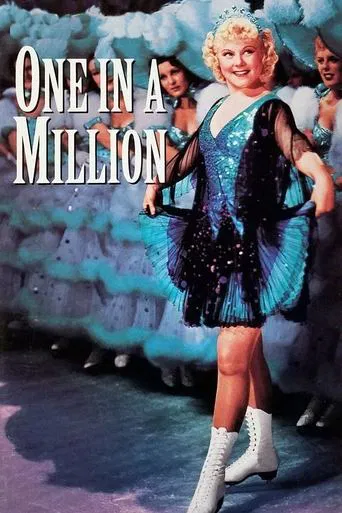

Wonderfully offbeat film!
... View MoreSome things I liked some I did not.
... View MoreOne of my all time favorites.
... View MoreStrong acting helps the film overcome an uncertain premise and create characters that hold our attention absolutely.
... View More'One in a Million' is interesting for being Sonja Henie's first American film and raised her to international stardom. Henie does not disappoint and is one of the top attractions, but the film on the whole does.Henie is one of the two best assets of 'One in a Million'. She is pert and charming, and the camera clearly loves her. Her ice skating is also out of this world. This is advantaged by the choreography for the ice skating sequences, which are enough to make the jaw drop by their imagination and verve.Furthermore, 'One in a Million' is lavishly shot and sumptuously designed, and while not timeless and none of them are standards the songs are pleasant enough, the best of them being "Who's Afraid of Love".Don Ameche is a very likable leading man, and his chemistry with Henie charming. Arline Judge brings snappy line delivery to 'One in a Million's' best lines, while Jean Hersholt is a gently low-key father figure and Ned Sparks is amusingly acerbic.However, the story is wafer thin and lacks energy, with much of the comedy floundering Judge and Sparks aside, while the script is even thinner and even duller. Adolphe Menjou, apart from a few nice moments with Judge, wildly overacts, shouting his way through his lines broadly.There is too much of the Ritz Brothers, and their slapstick is bizarre and irritatingly childish at times. Also could have done without Borrah Minevitch and his Harmonica Rascals, legendary as musicians but comedy, which is tedious and grating, is not even close to being a forte.In conclusion, a mixed bag of a film with great things and poor things. 5/10 Bethany Cox
... View MoreTwentieth Century Fox's "One in a Million" provides some light entertainment as well as the skating of Sonja Henie. The film has historic interest in that part of it takes place at the 1936 Olympics in Nazi Germany, though politics are never mentioned. Henie actually won the Olympics in 1928, 1932, and 1936. This film was released in December 1936 and apparently was done before the 1936 Winter Olympics took place.It's a slight story - Menjou and his troupe of performers arrive to work at a Swiss hotel, but find it has been burned down. They seek shelter at a nearby inn, run by Greta (Henie) and her father (Jean Hersholt). Reporter Don Ameche arrives to get the dope on the burnt hotel, apparently destroyed by an anarchist. Instead, he becomes interested in Greta and her Olympic quest and also her father's story. He was stripped of his Olympic medal in 1908 because he supposedly had worked as a professional, though he really hadn't. Menjou winds up endangering Greta's Olympic status in his zeal of signing her for his show.There is lots of music in "One in a Million" but most of it, including the title song, isn't all that great. "Who's Afraid of Love?" is pretty, particularly when sung by Ameche, who had a lovely, light tenor voice that matched his charming film persona. Though Ameche continued to star in 20th Century Fox films and had a marvelous career, after Tyrone Power arrived, the roles that would have been intended for him went to Power, including Power's breakout role in "Lloyds of London." Menjou is a little over the top, and the Ritz Brothers I'm sure entertained the kiddie crowd with their slapstick. Arline Judge, as Menjou's wife, gives one of the best performances with her dry delivery. She had the best lines, too, so I suppose that helped. Hersholt as usual is sympathetic and wonderful.Pretty, petite Henie was a natural for film. A vibrant presence on the ice, her skating, of course, was much less athletic than one sees today. As far as speed, spins, and showmanship, she could compete today. Some of her moves are no longer done - the pirouettes, which were really lovely, and that trademark dancing on "point" like a ballerina. The jump landings are interesting - rather than getting out of the jump quickly, the style in those days was to let the front leg continue to turn the skater into several circles, and jumps were landed with the head and body pointed downward. Some turns were done with a bent back leg, which looks really strange when viewed now. But Henie in her day elevated the sport of skating and should be appreciated for what she brought to it."One in a Million" is interesting for being Henie's debut. If you fast forward through the Ritz Brothers, you'll find it a lot more palatable.
... View MoreIt would be well to remember Sonia Henie as the prototype ice performer in her day. It would also be well to remember the times this film was made. Certainly it is devoid of all of the special effects and layers of pictorial events contained in todays films (which, by the way, are entirely unrealistic to us who are knowledgeable.) Of course the script follows mid 1930s writing and I did not find any of the actors giving less than other of their performances of the times. Given that this was Sonia's first film, her acting must be given some forgiveness there, though I did not see what others apparently viewed as less than optimal. As to the "other 1936 Olympics film," it was merely a propaganda documentary and therefore not a comparison by any means.As to Sonia's universal appeal, she went on to make many such films, and was known as a very smart businesswoman who went on to build great riches from investments and was the benefactor of many philanthropic ventures which was virtually unknown among actors of that era. On the strength of her appeal alone, I would rate her among the great women actresses of the time. I would recommend this film to any families who want wholesome "G" rated entertainment shown to their children.
... View MoreSONJA HENIE made a few very dazzling skating films but this is not one of them. The only saving grace for watching this is to see DON AMECHE as her singing co-star who does nicely with an uninspired song number and gives his usual charming and natural performance.Unfortunately, surrounding Henie with a talented supporting cast did not work in this case. THE RITZ BROS. routines wear thin pretty fast and carry on for much too lengthy a time. The Harmonica Gang is a clever act but, again, too much footage devoted to their antics which, I believe, were shown to better advantage later on by The Ed Sullivan Show TV appearances.The thin story is loosely based on Henie's own beginning as an Olympic Champion but is strictly formulaic in the telling. Henie's skating routines are hardly the best she ever offered on film. Indeed, one has to sit through long stretches of film dominated by the supporting actors in order to see even a glimpse of her on ice.Adolphe Menjou must have thought the microphones weren't carrying his voice properly. He shouts all of his lines in what has to be one of his poorest performances in a comedy role. Arline Judge has some snappy one-liners to throw at him, but most of them are so mild that they fall flat. Fortunately, Jean Hersholt gives a nice, low-key performance as Sonja's caring dad.Sorry to be so negative, but I did look forward to seeing Sonja in her American debut on film. She was later given much better material in her subsequent films--especially in SUN VALLEY SERENADE and WINTERTIME.Her camera style had not yet been developed. The make-up artist has given her an unflattering hairdo (the plastered down curls in typical '30s style) and the cameraman did not capture the Henie personality as was done in all of her later films. Zanuck obviously decided to keep her lines to a minimum and throw most of the story and routines to the supporting cast. It doesn't work.Strictly thumbs down on this one. Thankfully, there were better films in her future.
... View More